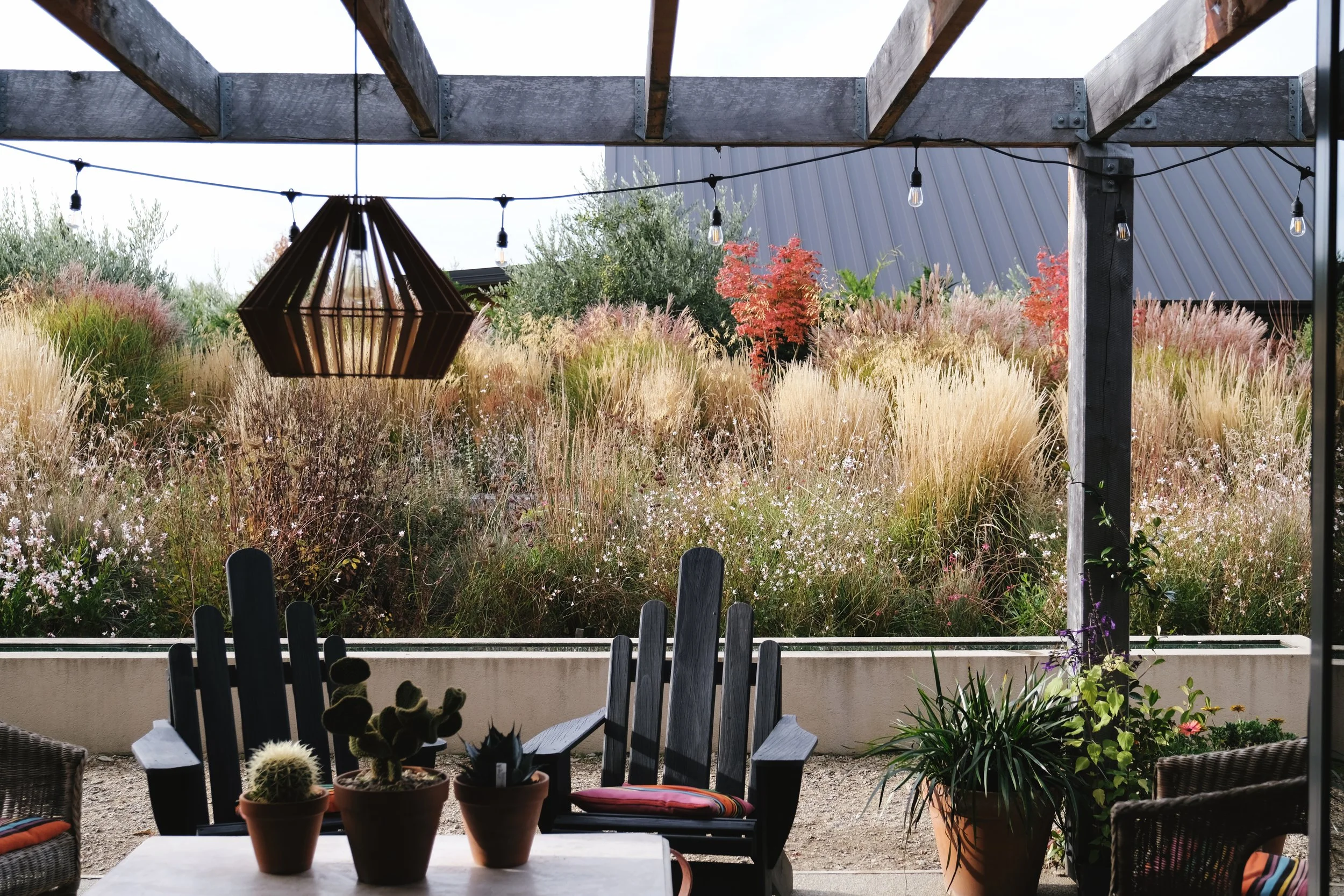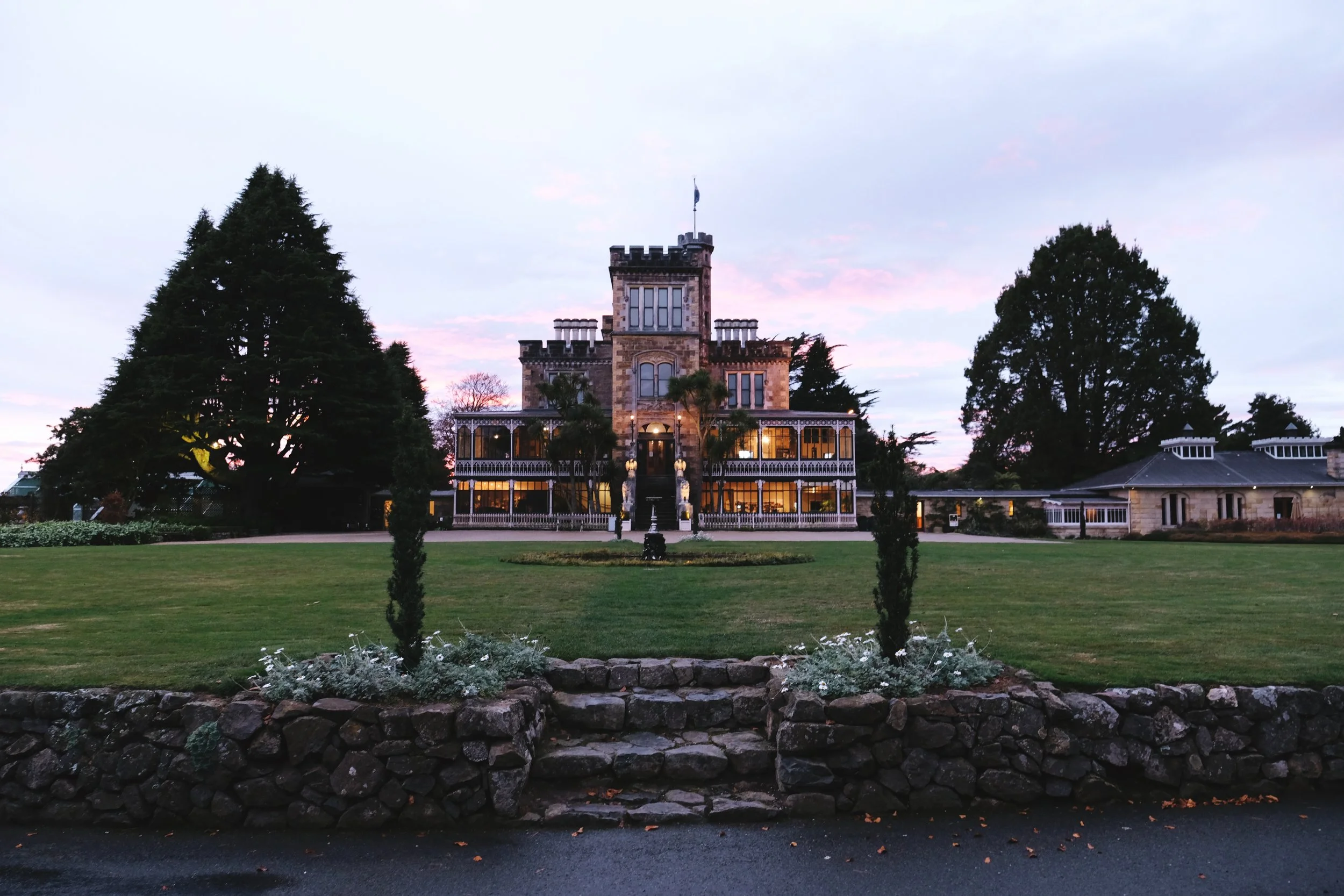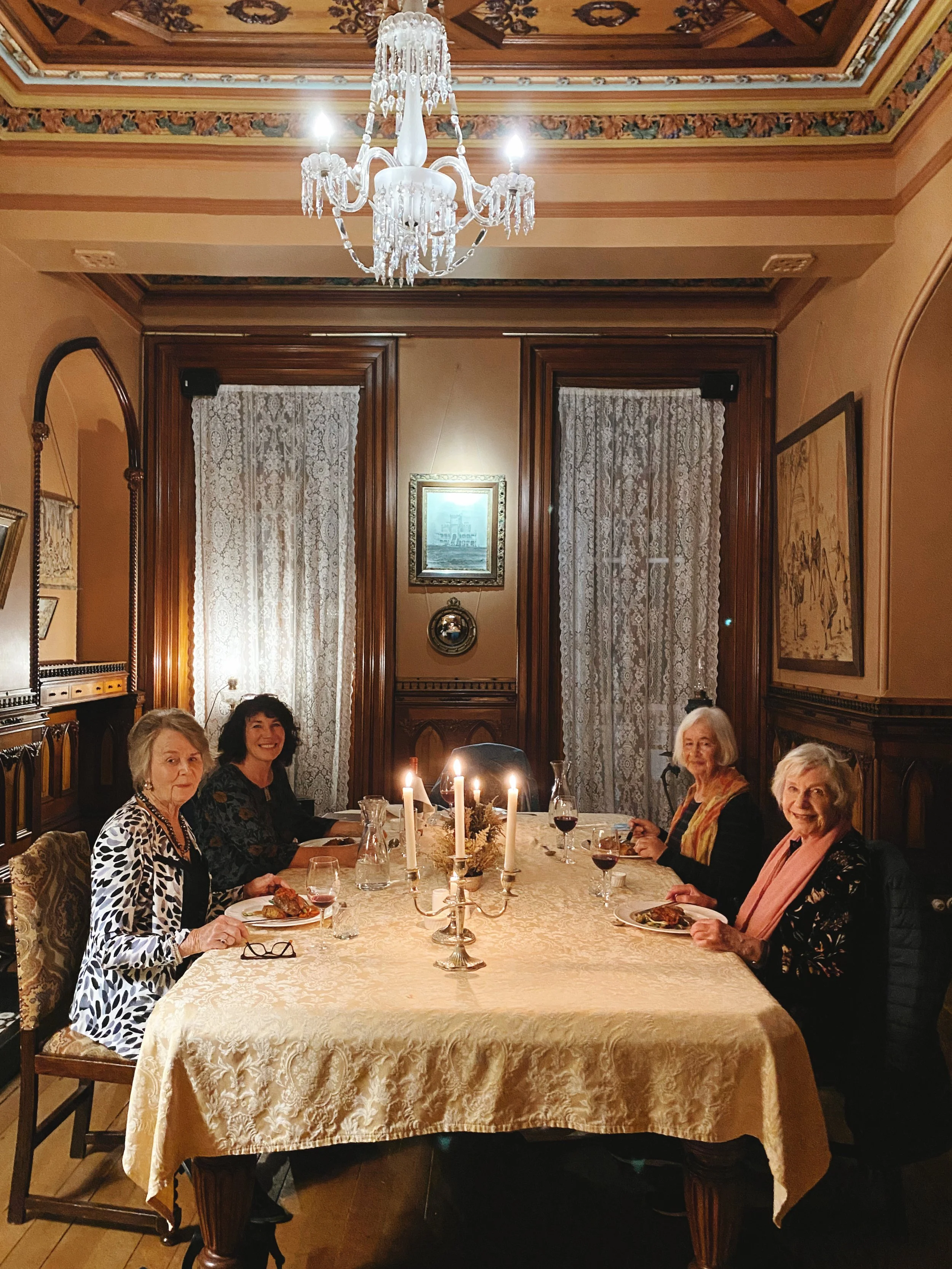Postcards from a garden road trip
/A few Fridays ago, I got up at the crack of dawn and pointed my car south, setting course to join a group of my mentors to tour gardens that met our mutual interests.
Our convoy of two cars (vital to allow for plant purchases!), led us to the dramatic landscape of Cromwell. With our first stop, we were generously welcomed to wander the magical naturalistic planting of Karen Rhind’s garden ‘Briar Dell’. Backlit in the low autumn light I was thoroughly transported by the soft splendour of her mixed perennial and grass border, thrilled to see mature combinations of tough plants that I have been experimenting with myself. Spread across a barren, stony river terrace and receiving little watering support, Karen’s planting ranges from ornamental to productive including arching rows of lavender and groves of olive trees for the natural products she sells through her store The Tent House.
Karen Rhind leading us through the path she cut into her border during lock down.
Beautiful ‘Briar Dell’ planted sympathetically with the stony, dry earth and climate it grows in.
This border is seen here in the textures of autumn. During summer it is dotted with colour from perennials.
Karen creates beautiful products from her lavendar and olives which are sold online and through her store in the Cromwell Historic Precinct, called The Tent House.
The following morning we pulled down a gravel road to the internationally renowned garden of Jo Wakelin. With bare moody hills acting as borrowed landscape on all sides, her extraordinary planting in gravel was a tapestry of texture and colour, pools of silver, green, rust and gold shifting softly into each other. My party crept their way through, discussing in botanical depth each resilient plant used, in what is, an entirely dry garden that exists on natural rainfall only.
From left - Robyn Kilty, Buffy Eaton, Penny Zino, Jenny Cooper pick the mind of Jo Wakelin.
This garden receives zero watering assistance. Plants are chosen for their hardiness and up to 12 cm of gravel acts as a mulch around them.
Amazing textures of very hardy plants used in this garden. In summer it is a tapestry of colour and blooms.
Native grasses sweep along the front of the house.
Yet another huddle to discuss the plants they were observing. I tried to be in amongst these as the well of knowledge was enormous!
Robyn Kilty in full documentation mode!
From here we took the beautiful drive through to Dunedin and on up the winding roads of the spectacular Otago Peninsula to our next port of call Larnach Castle. Having visited this outstanding place in summer last year, I gained a new appreciation of the acres of mature planting as it melted through autumn to its winter form. Castles are high on my list for visits and the next few days were made extra special with the time spent in the company of the owner and highly respected plantswoman, Margaret Barker. On her recommendation, we also visited Orokonui Ecosanctuary where we were delighted with astonishing native bush and the busiest birdlife I’ve come across in a long time!
Larnach Castle on top of Otago Peninsula in the autumn dawn.
Dawn from the sprawling and fascinating gardens at Larnach Castle.
The perennial border in full autumn textures
Westerly view on the grounds from the turret
A special castle dinner with iconic New Zealand plantswomen. From left, Penny Zino, Jenny Cooper, Robyn Kilty and Margaret Barker of Larnach Castle.
Exploring the fascinating Orokonui Ecosanctuary with plant lovers that investigated everything! This was observing lichen and fungi on a bank.
Penny Zino and Margaret Barker at Orokonui Ecosanctuary.
“ This trip was far from relaxing for me. Every moment presented a new lesson in gardening, gleaned from a group of women who led the way with their ambition and drive to push the bounds of natural aesthetics. I will be processing this for years to come no doubt, but I wanted to share some immediate takeaways from the experience. ”
Visiting gardens after the summer show has finished
Beyond seeking out the bright toasted colours of deciduous trees, I would never have sought to see gardens at this time of year. While many gardens that open their doors to the public tend to have a closed period through winter, it was on this trip that I discovered the immense importance of form after flowering.
From the sea of fantastical grass heads at ‘Briar Dell’ to the incredible contrast in tone and structure in the extraordinary dry garden of Jo Wakelin. I itch to return to see these places in full summer chorus to fully appreciate the efforts made by their creators for a year-round, seasonal display.
Slow your roll
As we passed through the predator gates at the Orokonui Ecosanctuary I marched off down the path, only to turn and realise I was alone and my compatriots were clustered around a tall native grass. Never have I inched through a forest like we did that day, eager discussion on lichen and climbing rata was only interrupted to stand in stillness at a bird feeding station. I not only gained a vast new insight into the intricacies of our native plants but also in every other we examined at each garden visited. This same crawl was repeated through all our walks, where single specimens were observed and discussed as much as the overall effect of the planting scheme.
Ask advice
In stark comparison to the creep through the forest, there was a charged vigour with which my travelling experts explored Blueskin Nursery. The team split five ways at furious speed as they urgently hunted out specimens they hoped would be in stock. While I left with just a single climbing hydrangea, I had been able to glean advice in real-time from my brain’s trust, realising how blind many of my purchases had been before. Had my friends not been there, I was reminded of the huge resources available in garden centre staff who can immediately fill gaps in your knowledge when selecting.
Gardening is a life force
I arrived home unable to speak for two days.
Even as we tiredly looked across the table at each other over lunch on the way home, no one had the ability to take a break from the incessant discussion of gardening. Over four days no other topic had been broached and my dried-up voice box was only matched by my overflowing brain. At times I felt panicked that I would never recall all I had learned by being part of this trip with such knowledgeable company. What I’ll never forget though, is the eagerness of these women to help me along, never blinking an eye as I incorrectly identified a plant or appeared blank-faced as they energetically debated the intricacies of one rare cultivar vs another.
More than a few years younger than the rest of my mates, every day I reflected on the curiosity, attention and drive they held for gardening. This trip was about appreciating the creativity of others while stoking the fire for their next big idea. They may have walked slowly to take in the plants, but there was nothing slow about their own lives. What a true inspiration each and every one of them is.
This is an expanded version of the article featured in my Stuff ‘Homed’ gardening column for beginners , The Press, Dominion Post and other regional papers on May 26th 2022
All words and images are my own, taken in the gardens that we visited on this trip.

































